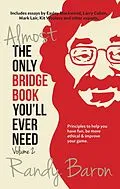There are many books and articles about how to improve your play, but there are few that focus on being a better partner, having fun and playing bridge the right way. In this book, there is plenty of technical advice. But more important, this book examines the best ways to participate joyfully in the world's greatest game. In this time of various scandals at the highest levels of bridge, these topics need to be promoted more often. Besides, there are thousands of players around the world who have limited awareness that they are making unethical bids, plays or hesitations, or taking advantage of partner's actions.
Although you might have come across some of these tips in various books and magazine articles, this book is unique by focusing more on having a pleasant time playing and making your table a welcome and pleasant place to be. What's more important than being a positive role model for everyone around you, getting along with others, and having a good time? You can choose which principles apply to you and your game. Much of what is appropriate for you to improve depends on your personality and how much work you want to put into being a better player, but frequently stressed throughout the book is that you can always be a role model for others.
By reading this book and sharing with your partners and friends, we'll all be doing a little more to make the bridge world a friendlier and better environment. Randy's been playing bridge now for about 50 years and worn all hats: expert, author, publisher, editor, columnist, teacher, politician, director, bridge club owner, and lately travel planner. He founded and spent 35 years as president of the world's largest bridge supplier, Baron Barclay Bridge Supplies.
There are many books and articles about how to improve your play, but there are few bridge books like this one. The intention of this book is to present a kind of Reader's Digest of essays and tips that can elevate your enjoyment and help you play with impeccable ethics. In Volume 2, Randy gives timeless advice including:
- Bidding secrets
- How to be a better declarer
- Essential defensive advice
Autorentext
By Randy Baron
Klappentext
Inhalt
Contents
Acknowledgments
Foreword
Introduction
SECTION ONE
Competitive Bidding
1. Interfere with Precision Club Auctions Whenever Possible
2. Play Structured Takeout Doubles
3. After Partner Makes a Takeout Double, When You Have a Bad Hand, Try to Discourage Partner, by Linda Green
4. Light Overcalls Are Fun and Frequently Helpful
5. It's Okay to Overcall in a Four-Card Suit When No Other Bid Is Appropriate
6. Avoid Overcalling When You Can't Stand the Lead
7. To Improve Your Competitive Bidding, Learn the Law of Total Tricks
8. The Best Way to Play Negative Doubles, by Larry Cohen
9. You Might Like to Try My (Advanced) Methods for Negative Free Bids/Negative Doubles and Jump Shifts
10. Three No Trump Is Often the Best Contract When the Opponents Open with a Preemptive Bid
11. Don't Hang Partner
12. Try to Force the Opponents to Make the Last Guess, by Kit Woolsey
SECTION TWO
Declarer Play
13. Think Before You Play at Trick One
14. Counting as Declarer Is Essential
15. Learn the Percentages When You Lack Other Clues
16. Learn the Law of Restricted Choice, by Shirley Silverman
17. Learn the Important Card Combinations
18. Learn Avoidance Plays to Keep the Dangerous Opponent Off Lead
19. When a Contract Looks Difficult, Establish Your Side Suit Before Pulling Trump
20. An Important Technique to Learn Is the Loser on Loser Play
21. When You Need Another Trick as Declarer, Play All of Your Winners to Put Pressure on the Opponents
22. Intermediate Cards Are Also Valuable, by Sharon Austin
23. No Five Card Suit in Dummy Should Ever Be Ignored, by Marti Ronemus
SECTION THREE
Defense
24. Study the Six Types of Defenses Against Suit Contracts
25. Good Defense Is Often Knowing Whether to Be Active or Passive Against a Suit Contract
26. Avoid These Six Dangerous Leads, by Easley Blackwood
27. Do Not Underlead an Ace on Opening Lead Against a Suit Contract
28. If You Have Other Alternatives, Avoid Leading an Unsupported Ace (No King) in an Unbid Suit on Opening Lead Against a Suit Contract
29. Lead Partner's Suit
30. When the Auction Calls for It, Lead a Trump on Opening Lead
31. Defensive Strategy Against Notrump Contracts
32. When You Are Defending, Count as Much as Possible
33. After Partner Makes the Opening Lead, You Can Think About the Deal After Dummy Plays, By Verna Goldberg
34. Always Pay Attention to the Small Cards, by Betty Starzec
35. To Cover or Not To Cover, by Mark Lair
36. When Declarer Leads Towards the K-Q-10-(x), Duck
37. When in Rome, Do as the Romans Do
38. Use Discretion When Signaling on Defense, Especially Against Top Players
39. The Ideal Falsecard Can Fool Declarer Without Misleading Partner
Appendices
Classic Bridge Books
Do You Know Your Partner?
Happiness is a Journey
Wise Travel Quotes
